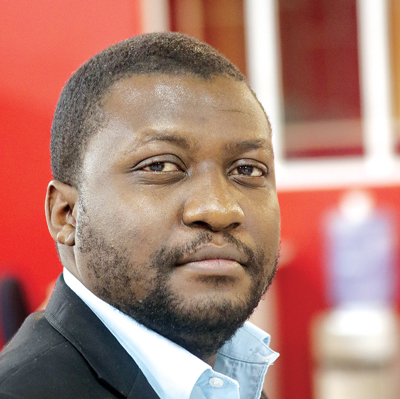
ON Tuesday, I left the Magistrates’ Court in Harare a free man for the first time in almost 19 months after I was charged with publishing falsehoods endangering the country’s economic and security interests in January last year.
Candour: NQABA MATSHAZI

This was after the State withdrew the charges, after our lawyers from the Zimbabwe Lawyers for Human Rights successfully argued that we had not committed a crime.
Had we been tried and convicted, the courts could have jailed us for up to 20 years, which is quite absurd, and that is why we challenged the case at the Constitutional Court (ConCourt), leading to the State conceding and dropping the charges.
While we — my colleagues Sifikile Thabete, Xolisani Ncube and I — naturally should have celebrated when we were released, it felt like a pyrrhic victory, there was a sense of an anti-climax and in the end, it feels like it is the State that ultimately won in this case.
What we wanted, initially, was section 31 of the Criminal Law (Codification and Reform) Act struck down and we were confident it would be, but the State made a strategic retreat, meaning the law that criminalises publication of falsehoods still remains in our statutes and like the sword of Damocles continues to hang menacingly over the journalism profession.
My nightmare started on January 7 when we were arrested and charged and mentally I was prepared to spend a night or two in police cells.
Once I had made peace with that, we were surprisingly driven to the court and before we could get there, we were ordered to return to the police cells, where we spent a very long night.
- Chamisa under fire over US$120K donation
- Mavhunga puts DeMbare into Chibuku quarterfinals
- Pension funds bet on Cabora Bassa oilfields
- Councils defy govt fire tender directive
Keep Reading
This messed up with my head and got me anxious and worried, as I wondered what was going on behind the scenes and what big man was driving the agenda for our incarceration.
We got bail the following day and soon we successfully applied to have our case referred to the Constitutional Court, but the State and the magistrate bizarrely continued to hold onto our passports on outlandish claims that we were flight risks.
In September 2016, the magistrate inexplicably said it would be premature to release our passports — a whole nine months after we were arrested — even if it was clear that the Constitutional Court case was not likely to proceed anytime soon and we had no incentive to flee, meaning we spent the whole of last year without our travel documents.
What I am convinced of is that the State never wanted to prosecute us and was not overly worried about getting a conviction, but rather it wanted to teach us a lesson.
I have heard someone use the term persecution by prosecution.
After winning our referral to the ConCourt, the police were not very co-operative with providing documents relating to our arrest, which were very important for our court case.
One officer reportedly refused to give the lawyers the documents because he was not impressed that we were challenging the State and our representatives had to find means of constructing the court record.
At some point, my colleague (and co-accused) went to court seeking the temporary release of his passport, but before that he was informed that our docket had been marked “security docket”, meaning its contents were a secret and highly important and could not be touched.
The whole process was quite convoluted and unnecessarily drawn out.
What this does to you, as an individual is it plays on your mind and haunts you day and night and while you are no longer in custody, it feels as if you are mentally incarcerated.
Self-censorship creeps in and you begin to doubt yourself and second guess every piece of information you receive before publishing.
The advantage of self-censorship for a government that is wary of a free Press is that it is intangible, the fear of offending the State is so ingrained that journalists shy away from “sensitive” stories and resort to “safe news”, which is what the authorities would have wanted in the first place.
Instead of using the police, army and State security agents, the lingering fear of being thrown into jail over the flimsiest and most spurious charges looms large and journalists are then mentally forced to retreat into shells and write tepid stories
I have no doubt that many people have gone through a similar process, where there is a long drawn out prosecution, which in the end just dies down because the State would have achieved what it wanted, to put the fear of God in you.
Once this happens, there is a temptation to withdraw from what you are doing and wonder if all the persecution and prosecution is necessary and, quickly, you start looking for a way out, even if it means dumping your passion.
One enduring quote on self-censorship is by George Packer in the New Yorker, who wrote: “The problem with free speech is that it’s hard, and self-censorship is the path of least resistance.
“But, once you learn to keep yourself from voicing unwelcome thoughts, you forget how to think them — how to think freely at all —and ideas perish at conception.”
This is the situation in Zimbabwe, where the government seems to abhor free speech and thought and will foster an environment of self-censorship by using the law and the courts to ensure that journalists and activists are always in fear of being jailed.
It has been a long 19 months, where fear and hope were my constant emotions.
While I am obviously elated to be a free man, my worry is that the government still has draconian laws in its arsenal, which it can deploy to silence critical journalists.
My wish was that we challenge the validity of section 31 in court and that it would be struck down, so that one more law that criminalises journalism is removed from the statute books.
So, I am in two minds; ecstatic that I can now get on with my life and travel a little since I now have my passport permanently and the other, that the danger is not gone and more journalists face a real prospect of arrest and being dragged down a long exhausting and emotionally draining court process.
Feedback: [email protected]











